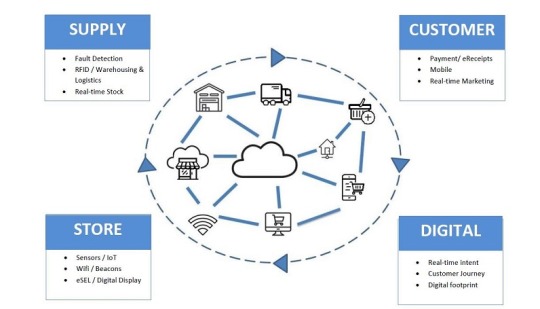By Thomas Hill, Kx Systems

Real-time is the latest in a
long line of terminology infiltrating the world of retail. So what is it, and
why do you need to care? Well, you don’t need to care, but Charles Darwin would
argue you should: “It’s not the strongest of the species that survive, nor the
most intelligent, it’s the one that most adapts to change.”
Technology is changing the
way we live, the way consumers shop and the way retailers need to operate. IT
terms like “real-time” are now commonplace in most meetings and it’s something
we all need to know and understand. Real-time retail technologies may or may
not have been invented by Amazon, but Amazon has enabled their exponential
growth and exploited them to become dominant in the new retail market.
Traditional retailers, like Maplin Electronics and Toys ‘R’ Us, that have not
been able to adapt quickly enough, have suffered as a result.
The Growth Of Technology And Data Is Leading To Changing
Consumer Expectations
New data sources, such as
that coming from sensors, is resulting in vast volumes of connected IoT data.
Retailers need to be able to manage these data volumes effectively and utilize
that knowledge to drive down costs while expanding sales. Understanding where every product and
customer is will be hugely powerful in delivering the key retail principles of
delivering the right product, at the right price, with an easy and fast
shopping experience.
We are already seeing
benefits of connected real-time data in retail today. Real-time fault detection
in manufacturing is made possible by streaming IoT data. Improved fill rates,
reducing waste and increasing availability are made possible through real-time
demand data. Perhaps most importantly, research shows that brands are finding
increased shopper loyalty through connection and personalization range across
the customer journey.

Innovating through connected
data is changing the way retailers deliver these principles in real time.
Customers expect ease, personalization and value — and they want it
immediately. A recent Kx survey of UK consumers revealed that these are the
most important factors in retailer selection.
Argos uses real-time data
within its connected supply chain and were identified as delivering the highest
multi-channel performance in our survey. This is an example of the enhanced
customer experience a retailer can offer by using real-time data, and one which
customers enjoy. Today, it’s no longer the best brands that win, but those that
are the easiest to shop with.
Marketplace And Direct-To-Consumer Are Accelerating In
2018
These emerging trends mean
that brands that traditionally sold their products through retailers are now
able to sell directly to the customers themselves. Marketplace platforms such
as INS within fast-moving consumer goods (FMCG) will result in intensified
competition as brands and retailers sell direct-to-consumers (D2C) in the same
space. As D2C and supplier integration grow, we are hurtling towards a world of
full transparency and individualized range personalization that will be key for
both product and price.
Another interesting trend is
dynamic pricing, which plays into the real-time evolution in retail. The
practice saw a slight decline in 2017, as retailers quite rightly approached
with caution due to consumers often being critical of the approach. However,
our survey reveals that 76% of UK consumers use technology to help them find
value when shopping. Range personalization will mean that product pricing will
ultimately become one-to-one, where retailers deliver individual offers based
on your personal shopping patterns.
Real-Time Bidding Will Be Key To Driving Share Of Wallet
Brands are competing
alongside each other and bidding for shoppers’ share of wallet. The retailer
that is able to connect and analyze data to react the fastest will win. To
enable this kind of quick and powerful decision-making, all data solutions and
services must be carried out in real time. Machines and algorithms that predict
shopper needs as they happen will be critical, as static models will no longer
keep up with the pace of change. Retailers need to be ready and adapt to these
changes, or risk being left in the dust.
Thomas Hill, SVP Retail Services of Kx Systems, is a respected retail and insight professional with a proven track record of developing data strategy, and landing technology solutions within retail and home shopping organisations. Hill currently leads the retail solutions division for Kx, driving forward the innovative use of technology to help retailers gain a competitive advantage from their data. This follows previous roles spearheading customer data strategy and solutions for companies such as Asda and Shop Direct.






